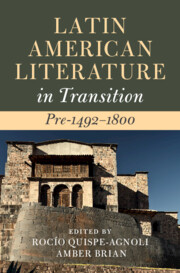Book contents
- Latin American Literature in Transition Pre-1492–1800
- Latin American Literature in Transition
- Latin American Literature in Transition Pre-1492–1800
- Copyright page
- Dedication
- Contents
- Figures
- Contributors
- Acknowledgments
- Introduction Dwelling in Transitions
- Part I Land, Space, Territory
- Part II Body
- Chapter 5 The Health of the Soul: Religious Guidance and Medical Practice in Early Colonial Mexico
- Chapter 6 Viceroy Valero’s Heart: A Traveling Relic and an Embodied Metaphor in Transit to the Indies
- Chapter 7 Humoralism and Colonial Subjugation: Indians and Medical Knowledge in the Sixteenth and Seventeenth Centuries
- Chapter 8 Assaulted Bodies: The Case of Two Enslaved Black Women in the Port City of Santa María de los Ángeles de Buenos Aires, 1772–1778
- Part III Belief Systems
- Part IV Literacies
- Part V Languages
- Part VI Identities
- Index
- References
Chapter 8 - Assaulted Bodies: The Case of Two Enslaved Black Women in the Port City of Santa María de los Ángeles de Buenos Aires, 1772–1778
from Part II - Body
Published online by Cambridge University Press: 25 November 2022
- Latin American Literature in Transition Pre-1492–1800
- Latin American Literature in Transition
- Latin American Literature in Transition Pre-1492–1800
- Copyright page
- Dedication
- Contents
- Figures
- Contributors
- Acknowledgments
- Introduction Dwelling in Transitions
- Part I Land, Space, Territory
- Part II Body
- Chapter 5 The Health of the Soul: Religious Guidance and Medical Practice in Early Colonial Mexico
- Chapter 6 Viceroy Valero’s Heart: A Traveling Relic and an Embodied Metaphor in Transit to the Indies
- Chapter 7 Humoralism and Colonial Subjugation: Indians and Medical Knowledge in the Sixteenth and Seventeenth Centuries
- Chapter 8 Assaulted Bodies: The Case of Two Enslaved Black Women in the Port City of Santa María de los Ángeles de Buenos Aires, 1772–1778
- Part III Belief Systems
- Part IV Literacies
- Part V Languages
- Part VI Identities
- Index
- References
Summary
Legal documents of the late colonial period enable us to understand how this agency was negotiated in domestic and public spaces and how black women became key protagonists in their struggle for respect and survival. This essay examines the case of two female slaves who lived in the port city of Santa María de los Angeles de Buenos Aires who were victims of physical abuse by two male acquaintances: resulting in death in one case and in a state of coma in the other. This chapter discusses how the recollection of events by both female slaves and their respective assailants transitioned from the public space to the official legal space of power. It analyzes how both women, prior to the end results of the physical abuse they suffered, fought for their right to be believed and respected especially when it came to their material bodies. In the context of my discussion, the body is understood as a vehicle for thought and action while simultaneously implicated in power relations and social order and disorder.
Keywords
- Type
- Chapter
- Information
- Latin American Literature in Transition Pre-1492–1800 , pp. 121 - 134Publisher: Cambridge University PressPrint publication year: 2022

